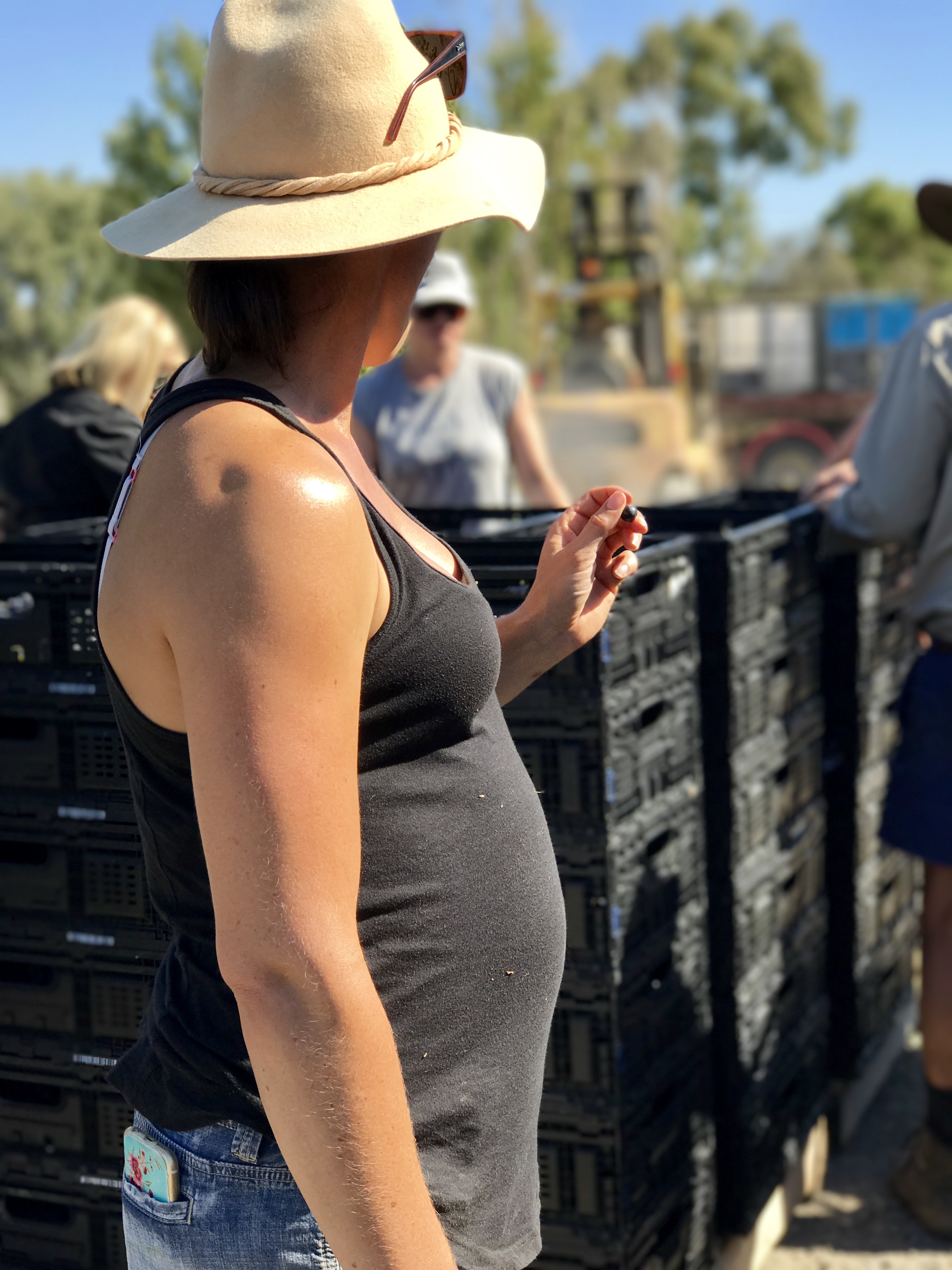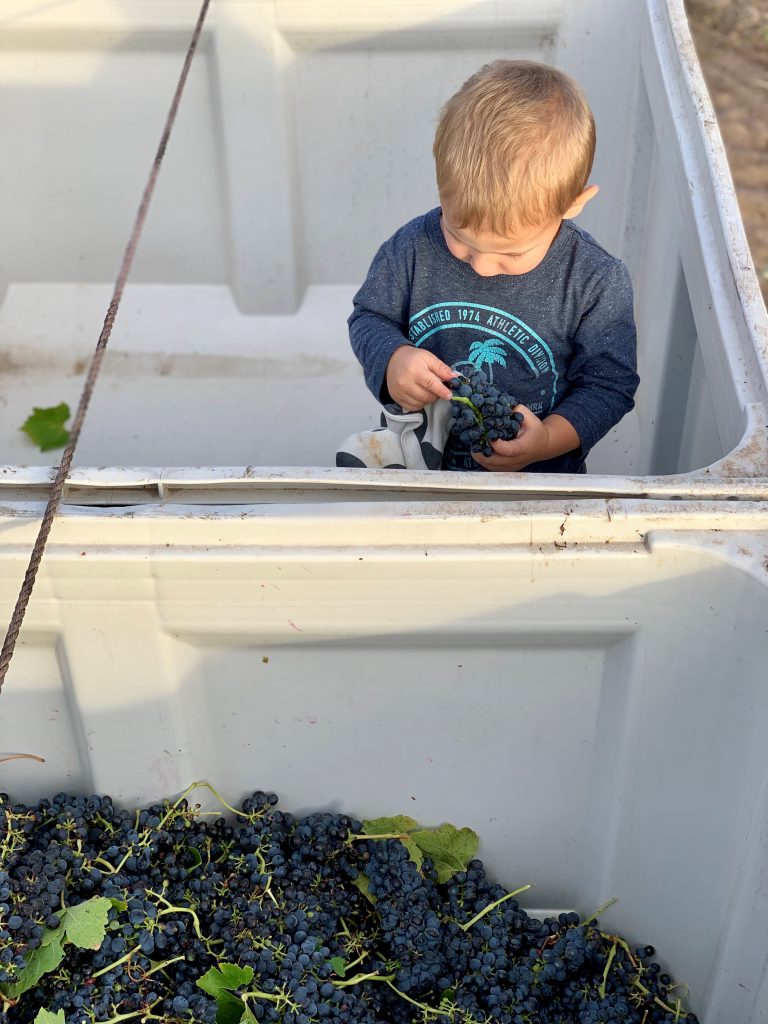A strong advocate for women in the wine industry, Corrina Wright, owner and winemaker at Oliver’s Taranga Vineyards in McLaren Vale, examines the options and obstacles when it comes to planning and taking maternity and parental leave.
Winemaking is a hands-on sport. It involves many senses – smell and taste in particular – and it is an interesting mix of chemistry, biology, horticulture, logistics, finance, problem solving, the creative arts, meteorology, mechanical engineering, the interaction of all these plus (sometimes more than) a dash of Hollywood; probably why we love it so much.
Winemaking (note: for the purposes of this article, when I say winemaking/winemaker, I am also talking about viticulturist, grapegrower, cellar hand; any role in the production side of wine) is also an area where we haven’t had the best track record in retaining women in our industry. This is even though women and men can perform all that is involved in wine production equally successfully. While women make up close to half of the university degrees, research shows that we are currently seeing only 10 per cent women in wine production (Galbreath, 2014). Many have postured at the reasons for this phenomenon. Could it be that wine has traditionally been male dominated? Perhaps conscious or unconscious bias plays a role. Is it because farming is a male arena? Some argue women aren’t physically cut out to work in a cellar. Maybe given that women are usually the primary carer, their career stagnates once babies come along? The fact is, we don’t really know why, because the research hasn’t been done in our wine community. I expect it is a mixture of many things.
Of course, the Sex Discrimination Act 1984 states that it is illegal to discriminate against a woman because she is pregnant or might be pregnant; that a woman who is pregnant should be able to continue to work in the same way and under the same conditions as other employees, unless there are valid medical or safety reasons, and; a woman who returns to work after maternal leave has the right to return to the same job she had before going on leave. So, there should be no problem, right?

In a national survey of 300 women in wine undertaken by the Australian Women in Wine Awards (AWIWA) board in 2016, 25% of women self-reported that they experienced unfair treatment around pregnancy and maternity leave. This same issue seemed to keep on raising its head in discussions, and, as part of the AWIWA board, I have been sought out many times by members of the wine community struggling in this area. Not just women trying to navigate their parental leave, but also wine business owners asking what the ‘best practice’ wine companies are doing for their employees. Not being an expert on this subject, and armed mainly with a deluge of negative experiences, I struggled to find answers. While many felt that progress towards better inclusion and flexibility for women was being made in other areas of the wine business, such as in sales and marketing, it was evident that wine production roles seemed to pose a particular challenge.
So, I turned to the authority on these types of serious issues, Facebook. I asked my wine network, and the AWIWA network of 1000+ women, to get in contact if they indeed had a positive maternity leave experience to tell. A small, but significant flow of responses rolled in and I have included direct quotes in italics from these discussions. I also went on a deep dive into the research and have tried to pull together some actions for wine business owners and their employees that seemed to have an impact on the ‘success’ of a parental leave journey for both parties.
What is ‘success’?
As a business owner or manager, retaining your human capital talent should be paramount. Not only does it cost a business actual folding money to find and hire and train a new employee, there is a considerable loss of irreplaceable ‘brains trust’ or corporate knowledge. Any media profile or networks attached to the winemaker that benefits the wine brand, quickly evaporates. Less gender diversity within a business has also been shown to have a negative financial impact on a business (Hunt et al. 2015). But a wine business needs a winemaker. It is a specialised skill that can’t be replaced by anyone off the street. “We are a small business, and flexibility is difficult, especially during vintage.”
As a career woman, whether it be in wine or otherwise, we often hear about the ‘glass ceiling’ phenomenon. This relates to the fact that there are significantly less women in management or board positions. A newer concept, is that women who choose to have children will hit the ‘maternal wall’ well before the glass ceiling is even close. This term describes the drop in career success and momentum that female employees have when they become pregnant, take parental leave, or when they return from parental leave (The Grace Papers, 2018). This wall has a long lasting impact on a woman’s career, resulting in significantly less superannuation, lower wages, and a slower career progression. “My perception of starting a family in this industry was that I would have to put my career on hold for at least two years starting from when I fell pregnant, as I thought I would be a liability in the winery during the pregnancy and thought that certain opportunities wouldn’t be offered to me during this period.”
So, for the purpose of this article, success is defined from both sides of the equation. Where the career of a new parent stays on track, and the business can successfully retain important business assets and continue to cover all the work that is required.
Check in on your business culture and bias
Whole books have been written on the importance of ensuring your business has a strong culture, so I won’t elaborate too much on that here. In parental leave discussions, it is important to check in on any bias you or other members of your management team may have. Do you feel deep down that once an employee has a baby they are no longer committed to their career? Do you avoid hiring women in the first place? Do you think that all women should be at home with the baby? If the answer to any of the above is yes, even just a little bit, then sadly it is unlikely that a satisfactory outcome is possible. “It came down to the men who lead the businesses I worked for and their sense of place, community and the importance they placed on your relevance, contribution and worth to
their business.”
In the wine industry there tends to be a focus on ‘presenteeism’, rather than flexibility in roles. Too often, work commitment is measured by the number of hours present, where longer equals more. Having a culture that rewards employees solely based on long working hours should be avoided, as it only perpetuates inefficient time management. Granted, vintage is a busy time, and a time sensitive one, but we are more connected than ever via phones and the internet if needed. Winemakers can sometimes be their own worst enemy in this space, with a tendency to be control freaks and a healthy dose of self-importance. Pretending we live in a world where our employees or ourselves are available 24/7 with no caring responsibilities isn’t remotely realistic or helpful.

Advocate and have a plan
All research into best practice suggests that a key to a successful parental leave is for the employee to come into negotiations with a plan that builds the business case. “I came up with a plan that had carefully considered both what was good for the business and what was good for me, and presented it to the owner when I announced my pregnancy.” Sometimes this can be difficult if you don’t feel in a position of power, but it is important not to underestimate
your value.
When I worked in corporate winemaking many moons ago, I was able to advocate for a job share arrangement with another senior winemaker returning from parental leave at a similar time to me. This was an excellent option for both of us, as well as the business, who was able to keep two able bodies and brains full of corporate skill and knowledge (and who did five days’ worth of work in three!)
Each plan will be different, tailored to both the individual and the business needs at that particular time. “He immediately made me feel like there were many options about how we could approach the leave for what would work best for me.” A one-size fits all approach is unlikely to be successful. Ensuring that there is balance between the individual and organisational needs in partnership is the best way to facilitate success.
Flexibility and flexibility
There does need to be an element of give and take in the negotiations, especially in smaller businesses where there are people on the ground. “There was a bit more organising involved to make sure we had assistant winemaker cover, and I stepped up myself to do more vineyard work in the short-term. But I would do it all again if the alternative was losing her for good and having to start again.” Flexibility from both sides to avoid the most negative outcome, in which one loses a career and the other loses a valued employee, is so important. “We started with the worst-case scenario and worked back from there to find a workable, flexible alternative for all.”
Flexible arrangements for return from parental leave will no doubt be part of the discussions. Contrary to popular belief and bias, research has shown that employees in flexible roles tend to be more productive than their full-time colleagues, simply by using their time more wisely. (Poynton & Rolland, 2013) A win-win situation for both the employee work-life balance and
business efficiency.
For a big surprise – communication and trust is key
Open and honest dialogue is paramount. Both between management and the employee planning parental leave, and with the rest of the winery team. Everyone impacted needs to be aware of the plan and how it will be managed moving forward. “So it worked because work was organised, communication was still happening and I had colleagues supporting me during my leave.”
This also applies once the employee is on parental leave. Regular updates at agreed times are important, both for keeping a link to the business in their absence and to check in on how the plan is tracking. Unforeseen issues may arise and goalposts may change, so the more notice there is, the more likelihood that any bumps in the road are able to be smoothed out. “I plan to take 18 weeks maternity leave. However, over vintage I will come in maybe once every two weeks (with baby) and taste some juices and check in with the team.” Trust plays a roll ensuring that both parties know that they have the other’s best interests at heart. Being honest about expectations and plans and the impact of these will only serve to build that trust.
I do hope this article has given you some food for thought and gives inspiration via some real success stories from highly respected small and large wine businesses. Many thanks to those who took the time to share their stories. I also hope this may give a colleague who is currently filled with joy at the prospect of a family, but a similar amount of dread about what that may mean for her winemaking career, some strategies to ensure that she can have both. “I hope other women in the wine industry feel as supported as I do going into my leave and that the industry is at a point where flexible work arrangements can be made to help with the transition back
from leave.”
References
‘Women in top roles in the wine industry: forging ahead or falling behind?’, Jeremy Galbreath. American Association of Wine Economists (AAWE) Working Paper No. 150, Economics (2014)
https://www.legislation.gov.au/Details/C2014C00002 Sex Discrimination Act 1984
‘Diversity Matters’ V. Hunt, D. Layton, S. Prince https://assets.mckinsey.com/~/media/857F440109AA4D13A54D9C496D86ED58.ashx (2015)
https://www.gracepapers.com.au/grace-papers/2018/7/20/dismantling-the-maternal-wall The Grace Papers (2018)
‘Untapped opportunity: The role of women in unlocking Australias productivity potential’ A. Poynton & L. Rolland (2013)
Further reading
www.intheblack.com/articles/2019/04/01/how-to-get-parental-leave-right
www.wgea.gov.au/sites/default/files/documents/WGEA-Leading-Practice-Parental-Leave-Policy-Guide.pdf
This article was originally published in the March issue of The Australian & New Zealand Grapegrower & Winemaker. To find out more about our monthly magazine, or to subscribe, click here!
















